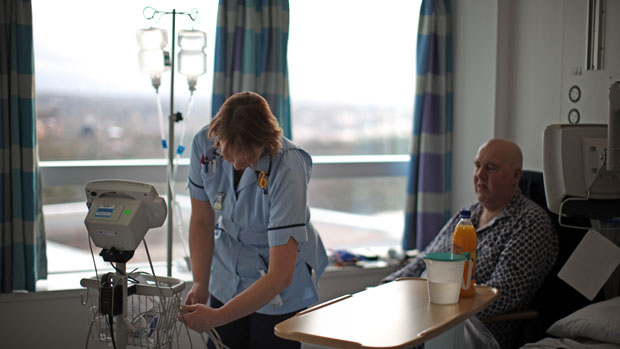NHS wasting £2bn by handing out too many drugs and tests
Academy of Medical Royal Colleges calls on doctors and nurses to stop overprescribing medication

A free daily email with the biggest news stories of the day – and the best features from TheWeek.com
You are now subscribed
Your newsletter sign-up was successful
The NHS is wasting more than £2bn a year by giving patients tests, drugs and treatments they do not need, according to a year-long study by the Academy of Medical Royal Colleges.
The professional body, which represents the country's 250,000 doctors, claims patients are too readily tested, diagnosed and treated for certain conditions.
It has called on doctors and nurses to prevent waste, arguing that it causes delays for other patients seeking help, particularly when the NHS is under unprecedented financial pressure.
The Week
Escape your echo chamber. Get the facts behind the news, plus analysis from multiple perspectives.

Sign up for The Week's Free Newsletters
From our morning news briefing to a weekly Good News Newsletter, get the best of The Week delivered directly to your inbox.
From our morning news briefing to a weekly Good News Newsletter, get the best of The Week delivered directly to your inbox.
The report found that over £1bn could be saved if doctors did not overprescribe drugs or "overmedicalise" patients who may not have the conditions they are told they have.
Another £221m is spent every year on one in five patients with lumbar spine or knee problems being x-rayed unnecessarily, while £466m is spent on the cost of hospitalising patients who have suffered adverse drug reactions.
The academy pointed to cases of best practice, such as the Royal Liverpool University hospital, which saved £11.5m by switching from twice-weekly to twice-daily ward rounds by consultants. This halved patients' average length of stay and cut bed occupancy by 7.6 per cent.
Meanwhile, the Royal Throat Nose and Ear Hospital in London managed to reduce the number of instruments required for cochlear implant operations from 96 to 28, saving money on cleaning and wear and tear, reports the BBC.
A free daily email with the biggest news stories of the day – and the best features from TheWeek.com
Professor Terence Stephenson, chairman of the academy, said that some findings in the report are the result of doctors doing everything they can to help a patient.
"The public can be very demanding, often fuelled by the internet, and can exacerbate this problem by demanding tests and treatments for which there's no evidence base, such as antibiotics for sore throats," he said. "The relentless demand of the public is for treatment here and now."
Health Secretary Jeremy Hunt said the study builds on the government's recently published report showing that the costs of unsafe care may be as high as £2.5bn a year. He said his department had launched a safety campaign aiming to halve avoidable harm and said today's report "underlines the potential for savings".
-
 How to Get to Heaven from Belfast: a ‘highly entertaining ride’
How to Get to Heaven from Belfast: a ‘highly entertaining ride’The Week Recommends Mystery-comedy from the creator of Derry Girls should be ‘your new binge-watch’
-
 The 8 best TV shows of the 1960s
The 8 best TV shows of the 1960sThe standout shows of this decade take viewers from outer space to the Wild West
-
 Microdramas are booming
Microdramas are boomingUnder the radar Scroll to watch a whole movie
-
 A real head scratcher: how scabies returned to the UK
A real head scratcher: how scabies returned to the UKThe Explainer The ‘Victorian-era’ condition is on the rise in the UK, and experts aren’t sure why
-
 How dangerous is the ‘K’ strain super-flu?
How dangerous is the ‘K’ strain super-flu?The Explainer Surge in cases of new variant H3N2 flu in UK and around the world
-
 The ‘menopause gold rush’
The ‘menopause gold rush’Under the Radar Women vulnerable to misinformation and marketing of ‘unregulated’ products
-
 How the care industry came to rely on migrant workers
How the care industry came to rely on migrant workersThe Explainer Government crackdown on recruiting workers abroad risks deepening care sector crisis, industry leaders warn
-
 Could medics' misgivings spell the end of the assisted dying bill?
Could medics' misgivings spell the end of the assisted dying bill?Today's Big Question The Royal College of Psychiatrists has identified 'serious concerns' with the landmark bill – and MPs are taking notice
-
 Washwood Heath: Birmingham's pioneering neighbourhood health service
Washwood Heath: Birmingham's pioneering neighbourhood health serviceIn the Spotlight NHS England chair says there is a 'really good argument this is the model for the future'
-
 The UK's first legal drug consumption room
The UK's first legal drug consumption roomThe Explainer 'Potentially transformative moment in UK drugs policy' as The Thistle opens in Glasgow
-
 How can the UK solve the adult social care crisis?
How can the UK solve the adult social care crisis?Today's Big Question New commission announced to turn our buckling care sector around: yet more delay or finally a way forward?